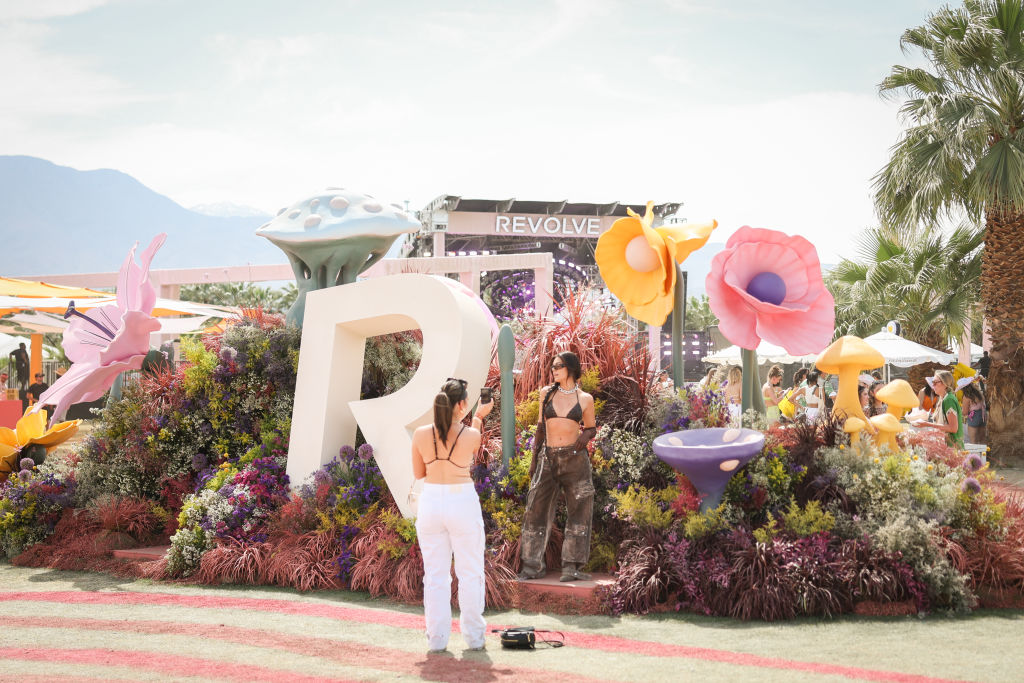If you scroll through the TikTok page of Linda Cuadros, a social media strategist and podcaster based in Miami, you will see viral videos of what she calls the “pre-influencer era’” of Coachella. There are images of flower crowns, the occasional celebrity sighting, and, most notably, way fewer social media influencers.
The Coachella Valley Music and Arts Festival, taking place in Indio, Calif. and now entering into this year’s second three-day weekend, has changed since Cuadros attended in 2014, 2015, and 2016. According to the comments on her videos with nearly 1 million views, she’s not the only one nostalgic for the Coachella she once knew. “This is what made me want to go, but now it’s a money pit for mostly influencers,” writes one viewer. “Throwback to when it was an indie event,” writes another.
Cuadros, like many others, has noticed that the music festival has become something more like the “Influencer Olympics,” a nod to the online content creators who have taken over the event in recent years. (The festival was canceled in 2020 and 2021 due to the pandemic.) “Coachella was more about the experience of discovering different music that you’ve never heard of before. And you weren’t so worried about how people were going to see you through Instagram and if you were wearing the right clothes,” she says. “Now people obviously do it all for the phone.”
Read more: Why Frank Ocean Isn’t Playing at Coachella This Weekend
Brands, fashion, and maybe a dash of music
Online content creators have upended many industries, from cosmetics to marketing, so it’s no surprise they’ve started to leave their mark on the music festival, which began in 1999. At Coachella, as with other high-profile events, brands sponsor influencers to attend the festival by providing them access to tickets and exclusive parties, in exchange for branded content created while they are there.
Current TikTok ‘it-girl’ Alix Earle, for example, attended Coachella this year courtesy of GUESS, flying in their private plane, wearing an all-denim sponsored outfit, and showing off the clothing brand’s ‘GUESS Originals Compound’ festival house and parties to her more than 5 million followers. For online creators at the festival, fashion often takes precedence over music. Earle’s Coachella videos accrued more than 100 million views, with her outfit videos getting the most traction. (Of the more than 25 videos she uploaded on TikTok, only one showed a musical set in the background).
Beware the festival fakes
The content surrounding the exclusive parties and photobooths, naturally, leaves creators’ millions of followers wishing they were there too. According to Loren Gray, an influencer and singer with over 75 million followers across platforms, much of it is smoke and mirrors. Gray gave viewers a behind-the-scenes scoop on the reality of many online personalities not actually attending the musical event despite their content portraying as much. Even those without brand sponsorships will try to make content surrounding the “it” place to be.
Gray also refers to the festival as “the influencer olympics” in a video shared on TikTok. “They just drive their little butts out to the desert to take Instagram photos, make TikToks and ‘Get Ready With Me’ [videos] and then they drive back,” she says. “If you feel boring and sad because you’re not at Coachella just know that most of those people aren’t there either. It’s like a very common occurrence.”
Cuadros alleges the same. “Some influencers go to the desert only to go to the pre- and after-parties and they skip the festival the entire time. There is more of a show-off culture,” she tells TIME.
From YouTube to TikTok
The event and the content coming out of it is evolving. Cuadros, along with her TikTok commenters, recalls that before the boom of TikTokers that are now attending the event, there were YouTubers who made long-form Coachella content that tended to portray a picture-perfect experience worthy of envy. That’s still the case with prominent creators out of TikTok like Earle. But the emergence of TikTok has also brought along a subset of many smaller creators who are making more vertical, short-form videos that candidly share what attending the event is “really” like.
This was on display last year, where micro-influencers on TikTok called out the Revolve Festival, the premiere invite-only influencer Coachella event, for having poor logistics that led to hours-long wait times in the heat. This year, many on TikTok were transparent about how Frank Ocean’s weekend-one headline performance was late, underwhelming, and cut short. He has since pulled out of his weekend-two performance, citing a leg injury.
Cuadros would eventually like to make her way back to Coachella. She’s been to several festivals, but Coachella is the “top festival” for her. Her excitement, though, is tempered by the realization that things may be different from when she last attended.
“The Coachella I went to was about living in the moment, having fun, and enjoying the music and atmosphere,” she says. Those days may not be coming back.
More Must-Reads from TIME
- Cybersecurity Experts Are Sounding the Alarm on DOGE
- Meet the 2025 Women of the Year
- The Harsh Truth About Disability Inclusion
- Why Do More Young Adults Have Cancer?
- Colman Domingo Leads With Radical Love
- How to Get Better at Doing Things Alone
- Michelle Zauner Stares Down the Darkness
Write to Mariah Espada at mariah.espada@time.com
